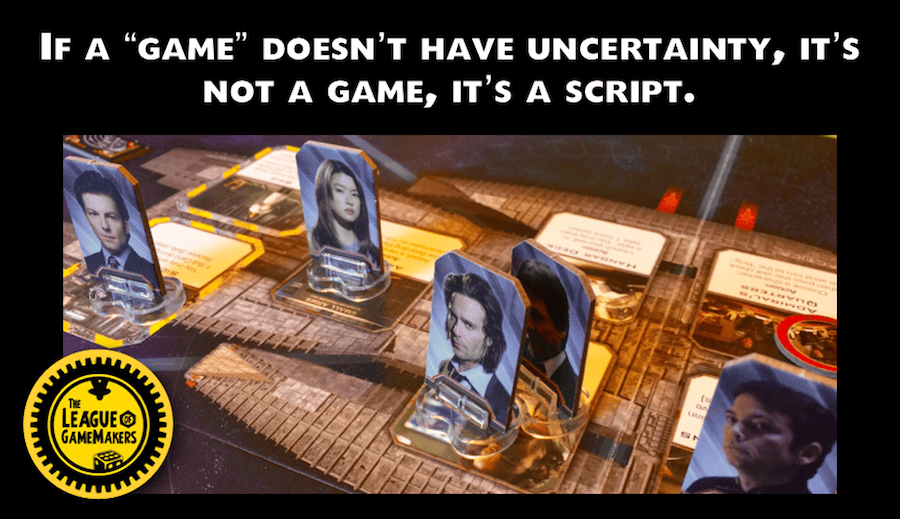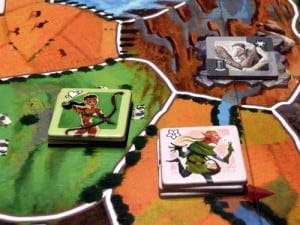
Today I continue my examination of basic game elements with uncertainty. If you missed my previous articles, you can see them here: Game Elements: Goals, Game Elements: Scoring, Game Elements: Actions, and Game Elements: Resources
Games need uncertainty. While uncertainty brings a lot of valuable qualities to games, such as intrigue, suspense, and replayability, it also brings something essential: a variety of outcomes. If a “game” doesn’t have uncertainty (at least in its first few playthroughs), it is not a game, it’s a script.
Today I’ll explore what uncertainty is, how it supports the player experience, and how it fits into games.
UNCERTAINTY IS NOT RANDOMNESS
The first thing I want to point out is that randomness and uncertainty are not the same thing. Randomness is a subset of uncertainty, but there are types of uncertainty that are not random.
One of the best examples of this is hidden information. In a game of Poker, after cards are dealt out, my hand is not random, it’s known to me. But it’s hidden from the other players, creating uncertainty. Such information imbalances can create very interesting gameplay.

A game does not need hidden information to contain uncertainty. Even Chess, a completely deterministic game, contains uncertainty. Even though the complete game state is out in the open, one player never knows what the other player is planning. What moves does she not see, and what moves does she see that I don’t? This uncertainty adds a lot to the game.
Compare this with Tic Tac Toe. Thinking about this simple game for a short amount of time, you can completely explore all possibilities, so even though you don’t know exactly what the other player will do, it doesn’t really matter, because you know all possible moves–there won’t be any unexpected surprises.
Randomness is unknown information to all players, or yet-to-be determined information. A roll of the die is random because the outcome isn’t determined until the die is rolled. Similarly, the top card of a deck is (usually) random because, even though it is already determined, no players know what it is. Randomness is a very important subset of uncertainty, but always remember that you do not need randomness for the benefits of uncertainty.
THE BENEFITS OF UNCERTAINTY
Uncertainty contributes to a fun play experience in many ways.
Suspense. Perhaps most obviously, uncertainty creates suspense in games. Unknown information gives players something to anticipate, creates tension leading up to the reveal, and eventually generates relief when the information is finally unveiled. This creates excitement and a generally positive experience for players, something also sought out when someone reads a mystery novel or watches a horror movie.

Intrigue. Information imbalances are one of the best ways to create interaction in games. When you know something I don’t know, I’ll work as hard as I can to figure out that information so I can benefit from it as much as you are. Similarly, if I know something you don’t know, I’ll try to use that information without giving it away. This can create some very interesting mind games, where I intentionally make a sub-optimal move to mislead you about what I know. Interaction is one of the main reasons people play tabletop games, and intrigue is one of the cleanest ways to add a surprisingly deep amount of interaction to basically any game.
Replayability. Sprinkling even a little randomness into a game’s setup can greatly increase its replayability. Slight varieties in starting conditions can have large downstream effects, making each game feel fresh.
Tactics. When a game has random events, players will frequently be presented with new game states. Not only will this keep the game varied, making each play feel different, it will reward tactical play. Players will not be able to fully anticipate the game, so will be presented with different situations all the time. Players who are able to think on their feet and react effectively to new game states will have a good time in a game where uncertainty creates frequent unusual situations.
Probabilistic thinking. Humans aren’t very good at thinking about probabilities. But for some people, it’s a fun skill to hone. Uncertainty creates opportunities for people to flex their probabilistic thinking muscles, which can be enjoyable. (And players who don’t like it can often ignore it, even if it hurts their results. Don’t worry, they’ll just blame the loss on bad luck.)
Skill balancing. When players of different skill levels play games together, a little bit of uncertainty can help level out the playing field. Who knows, maybe the weaker player will get extremely lucky, and the stronger player will get extremely unlucky! (That said, don’t rely on this too heavily, because it’s just as likely that the weaker player will get unlucky and will be crushed that much more badly.)
INCLUDING UNCERTAINTY
Most games benefit from uncertainty, but how can it be included in a game? There are many considerations.
Perhaps the most important issue to keep in mind when designing games with uncertainty is the danger that players might feel like they have no control over the game’s outcome. If the game seems to come down to a die roll or coin flip, the entire experience can become very unsatisfying. Balancing the benefits of uncertainty with this potential danger is probably the greatest challenge with designing games with uncertainty. So how can you avoid it?
 Avoid randomness. Hidden information and unpredictable player choices offer many of the same benefits as randomness, but feel less arbitrary. These also foster player interaction, a cornerstone of tabletop games. I highly recommend that you explore ditching randomness and let players make some of those decisions instead.
Avoid randomness. Hidden information and unpredictable player choices offer many of the same benefits as randomness, but feel less arbitrary. These also foster player interaction, a cornerstone of tabletop games. I highly recommend that you explore ditching randomness and let players make some of those decisions instead.
Keep randomness balanced. When the possible outcomes of randomness vary widely, and especially if there are particularly nasty outcomes for some players, that randomness can feel unfair and unfun. When outcomes are more balanced, the randomness will produce interesting variety rather than unfair swings.
Emphasize setup randomness rather than outcome randomness. There are two types of randomness worth considering. One I’ll call setup randomness, and the other outcome randomness. With setup randomness, something is determined randomly, but the players then get a real opportunity to react to that randomness. With outcome randomness, players may go into an event knowing some probabilities, but the course of the game is determined by randomness. This tends to feel less satisfying and more arbitrary. If you can, set your players up with randomness, but let them decide how they react to that random scenario. (Just make sure the setup randomness is balanced… it can be extremely frustrating to be randomly presented with an impossible situation.)
Constrain randomness. When randomness is totally unpredictable, it tends to feel arbitrary. But when it can be predicted in some way, it turns into an interesting puzzle. Pandemic makes great use of this by reusing infected cities. This gives the players something to think and strategize about, rather than making them feel like they’re completely the victims of fate.
 Let players modify random outcomes. If you need outcome randomness in your game (and some games do need it), give the players some control over it. Give your players several random outcomes to choose from. Or let players selectively modify random outcomes. However you do it, allowing your players to react to randomness always makes it feel less, well, random.
Let players modify random outcomes. If you need outcome randomness in your game (and some games do need it), give the players some control over it. Give your players several random outcomes to choose from. Or let players selectively modify random outcomes. However you do it, allowing your players to react to randomness always makes it feel less, well, random.
Keep it random. If you include randomness in your game, make sure there’s always some uncertainty in the outcome. In other words, try to avoid situations where something should be random (like rolling a die), but the outcome is known before hand. This is why in role playing games, a 20 is a critical hit and a 1 is a critical miss no matter what your skill is.
Avoid layering randomness. Randomness is best used like a strong spice: a light sprinkle goes a long way. One random aspect to a game is often enough for many of the benefits I’ve described, and including too much randomness is a great way to confuse your players at best and make them feel like they have no control at worst.
I LIKE THOSE ODDS
While some games get away with very little uncertainty, the vast majority of games released these days include a hefty dose of randomness, for good reason. It’s something you should definitely consider while designing your game, but it’s important to understand why it’s a solid addition to a game and how to include it effectively. Uncertainty adds suspense and replayability, but including too much randomness can leave a player feeling like they weren’t playing a game, the game was playing them. Err on the side of non-random uncertainty, or give players a chance to react to randomness.
What do you think? Are there any important aspects of uncertainty I missed here? Any games that make expert use of uncertainty in interesting ways? Let me know in the comments!








